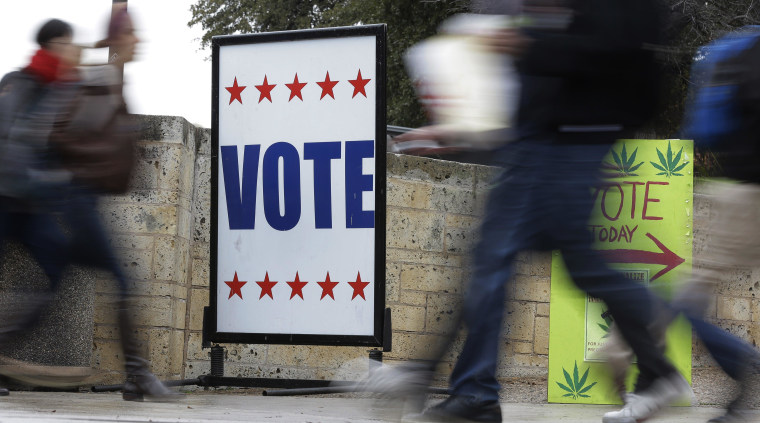A Texas-born and raised Latina federal judge, Nelva Gonzalez Ramos, did not just block a Republican-sponsored state voter ID law, she equated it to laws enacted by states after slavery was abolished to ensure blacks could not vote.
"The Court holds that SB 14 creates an unconstitutional burden on the right to vote, has an impermissible discriminatory effect against Hispanics and African-Americans, and was imposed with an unconstitutional discriminatory purpose," Gonzalez Ramos stated in her lengthy ruling issued Thursday. "The Court further holds that SB 14 constitutes an unconstitutional poll tax."
After slaves were freed and black Americans began to win elected office, laws requiring black Americans to pay a fee to vote or to pass literacy tests began to be enacted. Similar tactics were used in the Southwest against Mexican Americans.
Texas' strict voter ID law, passed by the Republican-led Legislature in 2011, only accepts certain forms of photo ID and does not allow other commonly used ones. It does not allow college student photo IDs, for example, but allows gun permits as identification.
The law would have made it extremely difficult for Texas Latinos such as 18-year-old twins Nicole and Victoria Rodriguez to vote, as groups argued in 2013. The young women at the time did not have driver's licenses since their parents could not afford car insurance, yet they had valid Texas birth certificates, high school IDs and Social Security identification. Still, they would not have been allowed to vote unless they traveled to a state office to get a special photo ID issued by the Department of Public Safety. Voting experts have pointed out the long distances and restricted hours of these state offices, which make obtaining the ID difficult for lower-income residents without cars as well as older voters.
The Justice Department filed a suit against the law. Voting rights experts argued in court that Texas Latino voters were 195 percent less likely to have the required photo ID than white voters, for black voters it was 305 percent.
The state's Attorney General, Greg Abbott, vowed to fight against the Garcia Ramos' ruling. "The U.S. Supreme Court has already ruled that voter ID laws are constitutional so we are confident the Texas law will be upheld on appeal," said Abbott. But voter and civil rights groups swiftly praised Gonzalez' Ramos decision.
“This decision will eliminate an unnecessary and discriminatory barrier to the ballot box for hundreds of thousands of Texans,” stated Myrna Perez, from the Brennan Center for Justice. “Elections in Texas will now be more free, fair, and accessible than they were a year ago.”
“The history of voter discrimination in Texas is well documented. Literacy tests, poll taxes, redrawing of electoral lines and other mechanisms have been used to intimidate minorities from voting," stated Brent Wilkes, national executive director of the League of United Latin American Citizens (LULAC), which has been fighting voter ID laws. "These efforts are un-American in that they are an assault on the democratic principles upon which this country was founded."
Texas Democratic congressman Joaquin Castro called the judge's ruling a "victory for Democracy," saying the law had been found unconstitutional for discriminating against minorities.
The law had been previously blocked by a federal court, but when the U.S. Supreme Court essentially gutted anti-discrimination protections in the Voting Rights Act last year, Texas quickly put the law into effect.
Apart from Texas' federal judge ruling, the Supreme Court on Thursday blocked Wisconsin's appeal to enforce a Republican-sponsored voter ID law just weeks before the Nov. 4 election. Voter groups argued they had no time to inform the public of the law's requirements. Wisconsin's attorney general said the state would try to find alternatives to answer concerns so they could go ahead with the law. In the meantime, voter groups hailed the ruling.
“While there is zero evidence of voter fraud, Wisconsin’s voter ID law would have risked disenfranchising hundreds of thousands of registered voters if it were allowed to take effect,” stated Katherine Culliton-González, a senior attorney and director of voter protection at the Advancement Project. “The Supreme Court was absolutely correct in refusing to fast-track restricting access to the ballot in the upcoming election."
As Texas federal judge Gonzalez Ramos pointed out in her ruling, voter fraud is extremely rare. A recent investigation found 31 incidents of voter impersonation - out of over 1 billion votes. Moreover, a recent report by the non-partisan Government Accountability Office (GAO) found voter ID laws in several states resulted in reduced voter turnout. In an op-ed on Friday, Attorney General Eric Holder stated, "It can no longer be disputed as mere assertion that voter ID laws are obstacles to citizens who wish to exercise their fundamental right to vote; as this report shows, it is clearly a fact."
Several days ago the Supreme Court did uphold North Carolina's strict voter ID law, which prohibits counting any ballots cast in the wrong precinct, eliminates same-day registration and voting as well as pre-registration for voters younger than 18, It also reduces the days allowed for early voting. Two Supreme Court Justices voted against the decision, Ruth Bader Ginsberg and Sonia Sotomayor. They said getting rid of same-day registration and other measures would significantly reduce opportunities for minorities to vote.
